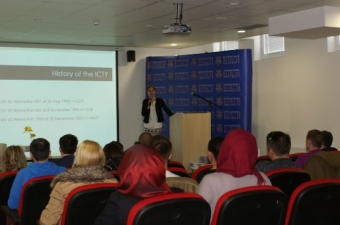As part of the Tribunal’s Youth Outreach Project, Lauranne Duffaut, Associate Legal Officer in the ICTY Appeals Chamber delivered a series of three lectures on “ICTY practice in adjudicating genocide and crimes against humanity”. The lectures were given to over eighty students of three universities in Sarajevo - International Burch University, Sarajevo School of Science and Technology (SSST) and International University of Sarajevo.
The first in the series of lectures took place on 27 April for students of International Law and Diplomacy of the SSST. The students showed great interest in the lecture and demonstrated extensive knowledge of the ICTY’s cases. One student asked whether it was possible to establish that genocide was committed in an internal conflict. Others were keen to learn more about hate speech, in particular how it might relate to genocide and whether the ICTY's judgements have dealt with this type of crime.
Later the same day, the ICTY representatives visited the International Burch University. During the discussion following the presentation, students wanted to know how difficult it was to prove serious physical and mental harm in the context of genocide charges. Some of the questions also referred to the Tribunal’s jurisprudence and the cases in which the genocide in Srebrenica was established. In addition, students were interested to know why genocidal intent was not proven in the Karadžić case in relation to certain Bosnian municipalities.
On 28 April, a lecture on the same topic was held at the International University of Sarajevo. It sparked a debate about the wider context of transitional justice, during which attending students and professors discussed the subject of criminal responsibility and the social and political implications of genocide for different communities in the former Yugoslavia. The students were keen to know if any written order to commit genocide had been found and how, in cases where such orders did not exist, genocidal intent was proven.
The management and teaching staff of the three universities praised the Tribunal’s initiative in organising the lectures and expressed interest in continuing cooperation with the ICTY Outreach Programme.


